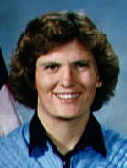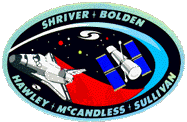|
Kathy Sullivan
–
astronaut, scientist, & oceanographer
|
 |
"
You need an interesting mix of vision and
optimism with realism and skepticism: the first two let you dream and
reach; the last two help you actually turn the dream into some reality."
|

|
| |
|
|
|
| |
How were you originally motivated to become an astronaut? |
| |
As far back as I can remember I was always curious about what the world
was like beyond the boundaries of my life. This fostered in me a strong
drive to explore our planet –– it's physical geography, peoples, languages,
cultures. I was also always rather adventurous, and was never
discouraged from
this by either of my parents.
Foreign travel was not in the cards as part of our family vacations, so
reading was my first means of pursuing my curiosity. I read voraciously
about other countries, interesting people, and the histories of different
places and cultures. Around age 11, a family friend provided a first
introduction to foreign languages and showed me I had a natural flair for
picking up phrases and pronunciation, and I decided that this would be my
key to creating a life of foreign travel and exploration. I chose my
college for its strength in languages and linguistics, but then discovered
(through mandatory science classes I at first resented having to take) the
fascination, adventure and intellectual fun of the earth sciences –– so I
changed majors and became an oceanographer. My college and grad school
years included extended periods living in Norway and Canada.
Though I had followed the space program from its inception with great
fascination, the idea of becoming an astronaut only came up near the end of
my PhD program, when the first space shuttle recruiting began. The
personal appeal was in the chance to be part of the most exciting and
demanding explorations of mankind in our century –– and the chance to
see the
earth out a spacecraft window with my own eyes.
|
|

|
| |
|
|
|
| |
What qualities are important in becoming a first–class astronaut? |
| |

|
|
It's certainly correct that a strong background in the sciences, math,
and engineering are among the key things you need to become an
astronaut.
But these are more like learned skills than really individual qualities.
I
think the qualities one needs are integrity, curiosity, internal drive (to
be a self–starter, set yourself high standards and goals even if nobody's
watching or grading you) and great perseverance. Since you don't conceive
of, plan or fly a mission alone, you also need some very good people smarts
and communication skills. And you need an interesting mix of vision and
optimism with realism and skepticism: the first two let you dream and
reach; the last two help you actually turn the dream into some reality.
|
|
| |
|
|
|
| |
What ideas can you suggest for a future human community on Mars?
|
| |
Many people will vie to provide the engineering and technology answers
to this question. Human factors and sociology, each of which is at least
as important to the community's success as is engineering, are likely to
get short shrift in conceiving of and planning the community. For it to
succeed, the people in this community must have a strong set of shared
values and strong faith that the common purpose is more important to their
fellow colonists than are personal motives. The development of social
structure, including "institutions" that nourish the spirit, foster shared
traditions and experiences will be critical as well.
|
|

|
|




